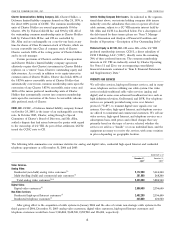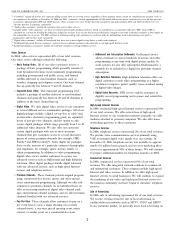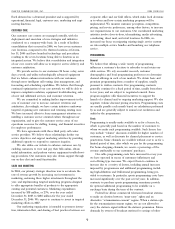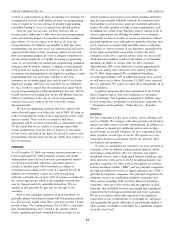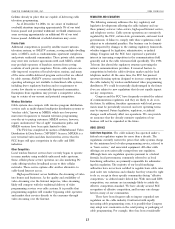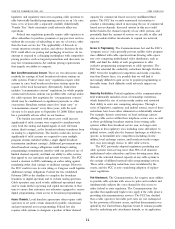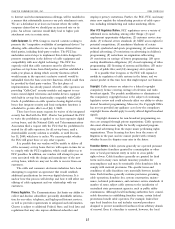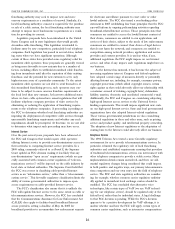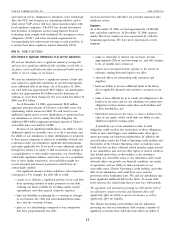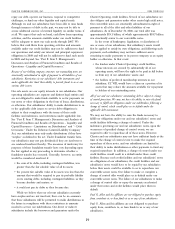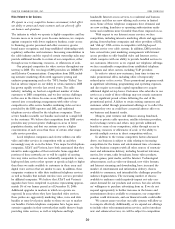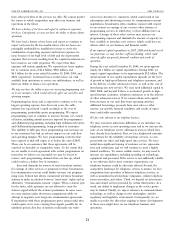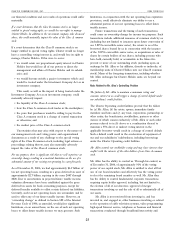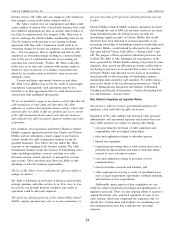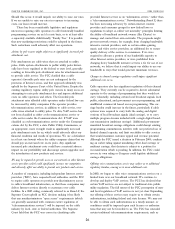Charter 2006 Annual Report Download - page 30
Download and view the complete annual report
Please find page 30 of the 2006 Charter annual report below. You can navigate through the pages in the report by either clicking on the pages listed below, or by using the keyword search tool below to find specific information within the annual report.
CHARTER COMMUNICATIONS, INC. 2006 FORM 10-K
franchising authority may seek to impose new and more for electronic surveillance pursuant to court order or other
onerous requirements as a condition of renewal. Similarly, if a lawful authority. The FCC also issued a non-binding policy
local franchising authority’s consent is required for the purchase statement in 2005 establishing four basic principles that the FCC
or sale of a cable system, the local franchising authority may says will inform its ongoing policymaking activities regarding
attempt to impose more burdensome requirements as a condi- broadband-related Internet services. Those principles state that
tion for providing its consent. consumers are entitled to access the lawful Internet content of
Legislative proposals have been introduced in the United their choice, consumers are entitled to run applications and
States Congress and in state legislatures that would greatly services of their choice, subject to the needs of law enforcement,
streamline cable franchising. This legislation is intended to consumers are entitled to connect their choice of legal devices
facilitate entry by new competitors, particularly local telephone that do not harm the network, and consumers are entitled to
companies. Such legislation has passed in several states, includ- competition among network providers, application and service
ing states where we have significant operations. Although providers and content providers. It is unclear what, if any,
certain of these states have provided some regulatory relief for additional regulations the FCC might impose on our Internet
incumbent cable operators, these proposals are generally viewed service, and what, if any, impact, such regulations might have on
as being more favorable to new entrants due to a number of our business.
factors, including efforts to withhold streamlined cable franchis- As the Internet has matured, it has become the subject of
ing from incumbents until after the expiration of their existing increasing regulatory interest. Congress and federal regulators
franchises, and the potential for new entrants to serve only have adopted a wide range of measures directly or potentially
higher-income areas of a particular community. To the extent affecting Internet use, including, for example, consumer privacy,
incumbent cable operators are not able to avail themselves of copyright protections (which afford copyright owners certain
this streamlined franchising process, such operators may con- rights against us that could adversely affect our relationship with
tinue to be subject to more onerous franchise requirements at a customer accused of violating copyright laws), defamation
the local level than new entrants. At least two additional states liability, taxation, obscenity, and unsolicited commercial e-mail.
where we have cable systems have issued regulations that will Additionally, the FCC and Congress are considering subjecting
facilitate telephone company provision of video services by high-speed Internet access services to the Universal Service
eliminating or reducing the application of franchising require- funding requirements. This would impose significant new costs
ments to the telephone companies. A proceeding is pending at on our high-speed Internet service. State and local governmental
the FCC to determine whether local franchising authorities are organizations have also adopted Internet-related regulations.
impeding the deployment of competitive cable services through These various governmental jurisdictions are also considering
unreasonable franchising requirements and whether any such additional regulations in these and other areas, such as pricing,
impediments should be preempted. At this time, we are not able service and product quality, and intellectual property ownership.
to determine what impact such proceeding may have on us. The adoption of new Internet regulations or the adaptation of
existing laws to the Internet could adversely affect our business.
Internet Service
Over the past several years, proposals have been advanced at Telephone Service
the FCC and Congress that would require cable operators The 1996 Telecom Act created a more favorable regulatory
offering Internet service to provide non-discriminatory access to environment for us to provide telecommunications services. In
their networks to competing Internet service providers. In a particular, it limited the regulatory role of local franchising
2005 ruling, commonly referred to as Brand X, the Supreme authorities and established requirements ensuring that providers
Court upheld an FCC decision making it less likely that any of traditional telecommunications services can interconnect with
non-discriminatory ‘‘open access’’ requirements (which are gen- other telephone companies to provide a viable service. Many
erally associated with common carrier regulation of ‘‘telecom- implementation details remain unresolved, and there are sub-
munications services’’) will be imposed on the cable industry by stantial regulatory changes being considered that could impact,
local, state or federal authorities. The Supreme Court held that in both positive and negative ways, our primary telecommunica-
the FCC was correct in classifying cable-provided Internet tions competitors and our own entry into the field of telephone
service as an ‘‘information service,’’ rather than a ‘‘telecommuni- service. The FCC and state regulatory authorities are consider-
cations service.’’ This favorable regulatory classification limits the ing, for example, whether common carrier regulation tradition-
ability of various governmental authorities to impose open ally applied to incumbent local exchange carriers should be
access requirements on cable-provided Internet service. modified. The FCC has concluded that alternative voice
The FCC’s classification also means that it is unlikely the technologies, like certain types of VoIP (we use VoIP technol-
FCC will regulate Internet service to the same extent as cable or ogy for our telephone service), should be regulated only at the
telecommunications services. However, the FCC has concluded federal level, rather than by individual states. A legal challenge
that the Communications Assistance for Law Enforcement Act to that FCC decision is pending. While the FCC’s decision
(CALEA) does apply to facilities-based broadband Internet appears to be a positive development for VoIP offerings, it is
access providers, setting a deadline of May 14, 2007 for unclear whether and how the FCC will apply certain types of
broadband providers to accommodate law enforcement requests common carrier regulations, such as intercarrier compensations
16


